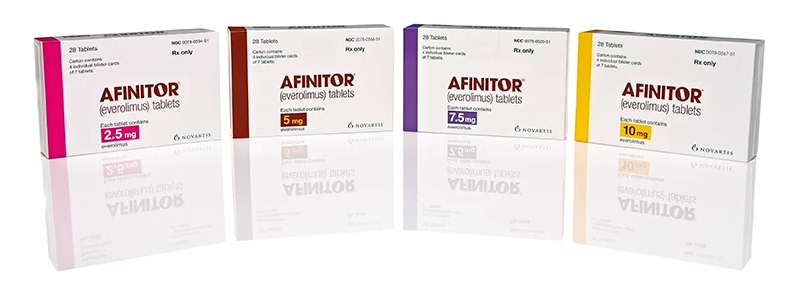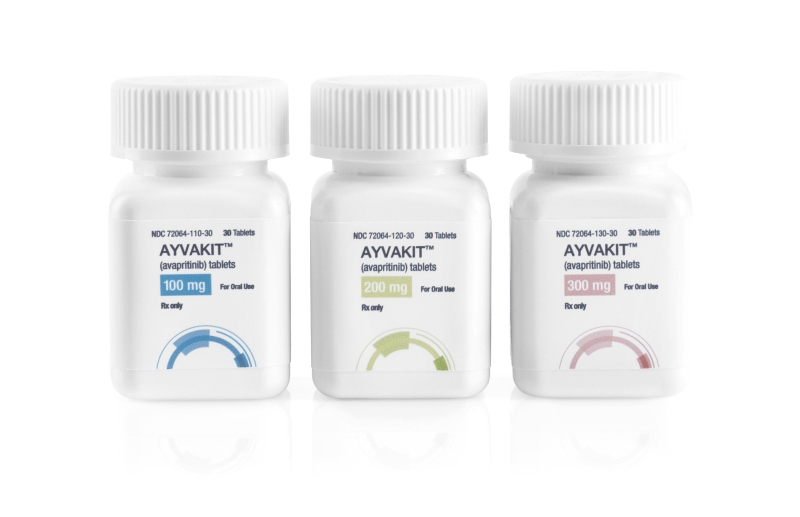Afinitor (everolimus) vs Ayvakit (avapritinib)
Afinitor (everolimus) vs Ayvakit (avapritinib)
Afinitor (everolimus) and Ayvakit (avapritinib) are targeted therapies used to treat different types of cancer. Afinitor is an mTOR inhibitor commonly used for advanced hormone receptor-positive, HER2-negative breast cancer, advanced renal cell carcinoma, and certain types of neuroendocrine tumors. In contrast, Ayvakit is a kinase inhibitor specifically approved for the treatment of adults with unresectable or metastatic gastrointestinal stromal tumor (GIST) harboring a PDGFRA exon 18 mutation, including PDGFRA D842V mutations, which is a very specific subset of GIST patients. When deciding between these medications, a patient should consult with their healthcare provider to consider the specific type of cancer they have, the genetic mutations present in their tumor, and their overall health profile to determine the most appropriate treatment option.
Difference between Afinitor and Ayvakit
| Metric | Afinitor (everolimus) | Ayvakit (avapritinib) |
|---|---|---|
| Generic name | Everolimus | Avapritinib |
| Indications | Advanced hormone receptor-positive, HER2-negative breast cancer, advanced neuroendocrine tumors, renal cell carcinoma, tuberous sclerosis complex-associated seizures, subependymal giant cell astrocytoma (SEGA), renal angiomyolipoma | Unresectable or metastatic gastrointestinal stromal tumor (GIST) harboring a PDGFRA exon 18 mutation, including PDGFRA D842V mutations in adults |
| Mechanism of action | mTOR inhibitor | Kinase inhibitor |
| Brand names | Afinitor, Zortress (USA), Votubia (EU) | Ayvakit |
| Administrative route | Oral | Oral |
| Side effects | Mouth ulcers, infections, rash, fatigue, diarrhea, edema, abdominal pain, nausea, fever, headache, decreased appetite, dyspnea, cough, taste changes | Edema, nausea, fatigue, cognitive impairment, vomiting, decreased appetite, diarrhea, hair color changes, increased lacrimation, abdominal pain |
| Contraindications | Hypersensitivity to everolimus or other rapamycin derivatives | Hypersensitivity to avapritinib or any of its excipients |
| Drug class | mTOR inhibitor, Immunosuppressant | Tyrosine kinase inhibitor |
| Manufacturer | Novartis | Blueprint Medicines Corporation |
Efficacy
Efficacy of Afinitor (Everolimus) in Treating Intestinal Cancer
Afinitor (everolimus) is a medication primarily known for its immunosuppressant and antineoplastic properties. It is an inhibitor of the mammalian target of rapamycin (mTOR), a protein that plays a critical role in cell proliferation and growth. In the context of intestinal cancer, the efficacy of Afinitor is specific to certain types of tumors. For example, it has been approved for use in treating advanced pancreatic neuroendocrine tumors (PNETs), which can occur in the intestines. Everolimus has been shown to slow the progression of these tumors, but it is not a cure for cancer. The drug's effectiveness in treating PNETs is supported by clinical trials that have demonstrated a significant increase in progression-free survival compared to placebo.
However, the general efficacy of Afinitor in treating other forms of intestinal cancer, such as colorectal cancer, has not been established with the same level of evidence. The use of everolimus in conditions outside of its approved indications is considered off-label, and the benefits for other types of intestinal cancer would need to be evaluated on a case-by-case basis, considering the latest clinical research and individual patient circumstances.
Efficacy of Ayvakit (Avapritinib) in Treating Intestinal Cancer
Ayvakit (avapritinib) is a kinase inhibitor that is specifically designed to target the KIT and PDGFRA mutant kinases. It has shown efficacy in treating gastrointestinal stromal tumors (GISTs), a type of cancer that can occur in the digestive tract, including the intestines. Avapritinib is particularly effective for GISTs that harbor a mutation in the PDGFRA exon 18, including the D842V mutation, which is resistant to other tyrosine kinase inhibitor (TKI) treatments. Clinical trials have shown that avapritinib has a significant antitumor activity in patients with PDGFRA exon 18 mutant GISTs, leading to its approval for this indication.
It is important to note that the use of Ayvakit for other forms of intestinal cancer beyond GISTs with specific mutations is not established. The drug's efficacy and safety for off-label use in other types of intestinal cancer would require careful consideration of emerging clinical data and a thorough understanding of the molecular profile of the individual patient's tumor. As with any medication, the decision to use Ayvakit off-label should involve a comprehensive evaluation of potential risks and benefits by a healthcare professional.
Regulatory Agency Approvals
Afinitor
-
European Medical Agency (EMA), European Union

-
Food and Drug Administration (FDA), USA

-
Health Canada

-
Pharmaceuticals and Medical Devices Agency (PMDA), Japan

-
Therapeutic Goods Administration (TGA), Australia

Ayvakit
-
European Medical Agency (EMA), European Union

-
Food and Drug Administration (FDA), USA

Access Afinitor or Ayvakit today
If Afinitor or Ayvakit are not approved or available in your country (e.g. due to supply issues), you can access them via Everyone.org.
How it works

Make an enquiry
Choose the medicine you want to buy, answer a couple of questions, and upload your prescription to speed things up. We’ll get back to you within 24 hours.


Make an enquiry
Choose the medicine you want to buy, answer a couple of questions, and upload your prescription to speed things up. We’ll get back to you within 24 hours.


Breeze through the paperwork
We'll guide you through the required documents for importing unapproved medicine, ensuring you have all the necessary information.


Get a personalized quote
We’ll prepare a quote for you, including medicine costs and any shipping, administrative, or import fees that may apply.


Receive your medicine
Accept the quote and we’ll handle the rest - sourcing and safely delivering your medicine.

Some text on this page has been automatically generated. Speak to your physician before you start a new treatment or medication.
Let's talk
If you have any questions, call us or send us a message through WhatsApp or email:
Contact us




